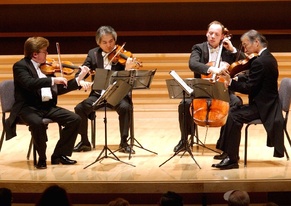
If the secret to a successful career in music is being asked back, the Tokyos are doing brilliantly. Here’s an interview I conducted with first violinist Martin Beaver, for the Houston Chronicle, originally published on September 8.
However, the current first violinist, Martin Beaver, has “only” been with the quartet for nine seasons. In 2002, when he was chosen as the Tokyos’ first violinist (the fifth in the group’s history), he was the new kid on the block. Nowadays, he’s starting to feels more like an old hand.
Like everyone else in the quartet, Beaver plays an instrument made by the master craftsman Antonio Stradivari, once the property of the legendary virtuoso Niccolò Paganini. However, the Tokyos don’t own these Strads (if they did, they’d be very rich men). They’re on loan from Japan’s Nippon Foundation.
Speaking from his home near New York, the 43-year-old Canadian violinist explained what it’s like to play in a quartet that’s a fixture in the classical music world.
Q: I guess it would be an understatement to say you’re no stranger to Houston.
A: Yes, the Friends of Chamber Music have been stalwart supporters of our quartet.
Q: Why do you play in Houston so often?
A: Our quartet has enjoyed great success in Houston over the years. The quartet really does have a special relationship with the audience, it seems. There are many faithful concert-goers who are fans and friends of ours. It’s something we value highly.
Q: You’re just starting your tenth season with the Tokyo Quartet. Does that mean you’re no longer the new guy?
A: I can’t really compare myself with our violist, who’s been in the quartet for 41 years. In that sense, I’m still the relative newcomer. But I feel, at this point, that we know each other well, and that things have meshed well, both musically and personally, over the last few years. It doesn’t feel like a new job any more.
Q: And obviously you must like it: you’re still in the quartet.
A: I can’t think of better way for a violinist to explore great compositions in all different styles and periods than by playing in a fine quartet. If you can tolerate all the travel – which I seem to be able to do – it’s the best of all worlds.
Q: There seems to be a kind of mystique about playing in a string quartet. What’s so special about it?
A: It’s a great feeling to know you’re one of four equal partners, who are coming together to play such great repertoire. With only four players, each member of the group has a lot of artistic control and autonomy. Yet you have to somehow agree on your interpretation – and that’s a tricky thing.
Q: In the case of the Tokyo Quartet, you also have a matched set of Stradivarius instruments – and that must be a huge benefit. What does it do for the group to work with such fine instruments?
A: I would say, first and foremost, that because the instruments all came from the same maker, it makes it possible to achieve a really nice blend of sound. And Strad instruments will afford the individual player a wider palette of colors. That means we can more readily achieve different and special colors – colors that you might not get from lesser instruments.
Over the years, we’ve all had to come to terms with the instruments and their particular personalities, and make them work for the quartet as a whole. That can sometimes be a bit of a challenge. But it’s nice to know you can play the softest pianissimo, and it’s still going to be heard at the back of the hall, no matter how big the hall is.
And of course people are always fascinated to see four Strads on stage, and hear a quartet of instruments that was assembled by Paganini. He put these instruments together as his own set of quartet instruments.
Q: On your Houston program, you’ve inserted the Quartet No. 1 by the Polish composer Karol Szymanowski between works by Haydn and Schumann. It’s not a piece that’s played very often – so what attracted you to it?
A: To be quite honest, we were looking for something that was off the beaten path – something we’ve never played before. The middle slot in the program is often reserved for something a little new and different. We’ve performed it a few times already, and so far the audience response has been tremendous. Everyone seems to love it.
Q: So what’s the secret of the Tokyo Quartet’s longevity? How has the ensemble held together for more than four decades?
A: Speaking as someone who’s been in the quartet for nine years – I’d say that the success of the group has fueled its ability to stay together. Over the years, a lot of the Tokyo Quartet’s members have shared the same traditions, and a love of playing the quartet repertoire. I think that has kept the group going.
It’s a big responsibility to be a member of a quartet that has enjoyed such success over so many years. We’ve been lucky that everyone has held the same musical ideals.
© Colin Eatock 2011
 RSS Feed
RSS Feed

